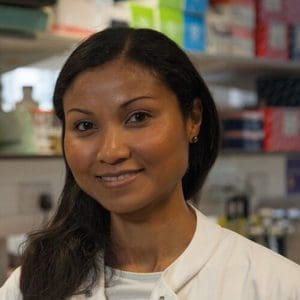
As follicular lymphoma (FL) treatment evolves, a key question arises: Do we still need chemotherapy to treat FL? As part of our webinar series, Professor Jessica Okosun, FLF Scientific Advisor, addresses this and other crucial questions, including emerging chemo-free options.
With new clinical trials and evolving research, there is a growing conversation around what the industry calls chemo-free options for follicular lymphoma patients. This refers to treatments that do not involve traditional chemotherapy, which typically uses drugs to kill the rapidly dividing cancer cells. Even though many chemo regimens for FL are considered “mild”, they certainly have side effects. These alternatives aim to treat FL without the commonly associated side effects such as fatigue, nausea, risk of infection and hair loss.
Explore more on FL clinical trials in our webinar, where Professor Jessica Okosun joined Dr. Mitchell Smith, FLF Chief Medical Officer, alongside two inspiring individuals living with FL, who shared their personal experiences on clinical trials.
A: We have to remember that chemotherapy has been the backbone of treatment in many lymphomas including follicular lymphoma, together with monoclonal antibodies like rituximab for a few decades because they are very effective for targeting and removing the cancer cells. However, chemotherapy can affect both cancer cells and normal cells and as a result, this leads to some recognized side effects and long-term risks. This has raised the question about whether there are alternative treatments that could be just as effective (or better) and safer with less side effects and risks commonly associated with chemotherapy. Until we find that alternative, chemotherapy will likely remain an important treatment for patients with follicular lymphoma, particularly as a first treatment.
A: Depending on the geographical region of patients, there are a number of chemo-free options, the majority being available when patient’s lymphomas have returned (relapsed). One such combination treatment is rituximab together with lenalidomide, a drug that can target the environment that surrounds the cancer (the microenvironment). The microenvironment in follicular lymphoma is recognized to be important for sustaining the growth of the lymphoma and so it is certainly desirable to be able to have treatments that targets this. The chemo-free combination of rituximab and lenalidomide was compared to rituximab plus chemotherapy in a large clinical trial called RELEVANCE. This trial showed us that rituximab and lenalidomide was just as effective as rituximab plus chemotherapy and was associated with less infections and neutropenia (low blood count). However, there are still side effects related to chemo-free treatments like rituximab and lenalidomide, so whilst they are chemo-free, one must bear in mind that they are not side effects-free.
A: It is a good question. There are very promising results showing that patients with relapsed follicular lymphoma really benefit from bispecific antibodies. Bispecific antibodies are a new generation of treatment that act like a lock and key, one arm grabs the cancer cell and the other grabs the immune cells bringing it closer to the cancer to help attack and eliminate them. Due to this, there are now several clinical trials in follicular lymphoma patients that are investigating how bispecific antibodies in 1st line together with chemotherapy or chemo-free drugs like lenalidomide compares to the conventional treatment. If the results of these trials demonstrate that the bispecific antibody combination is better and safe, then this might change the face of 1st line treatment for follicular lymphoma patients in the future.
“Trials for follicular lymphoma are important for every aspect of a patient’s journey—whether it’s treatment in the frontline, or in the relapse setting where there is no standard of care. This can sometimes be challenging because there’s no real consensus on how to treat patients when FL relapses.”
This ongoing research is crucial, particularly in the relapsed setting where more effective treatments are urgently needed. Watch our webinar on relapsed follicular lymphoma which featured leading experts, who explored the latest treatment advances, along with a patient speaker sharing their empowering journey and insights on managing this challenging stage of the disease.
Read more on our webinar series, including topics such as Cutting-Edge Treatments for FL: What’s New and What’s Next and FL and You: Emotional Health and Wellbeing.
Stay tuned for more Q&A sessions with leading experts in FL research!
To keep updated with news and upcoming webinars, sign up for our regular newsletter here and follow us on social media.
Visit Your Support Hub to access the help and resources you need and start living well with follicular lymphoma today.
Disclaimer: The information provided in this blog post is for educational purposes only and should not be considered a substitute for professional medical advice. Always consult with your healthcare provider for personalised guidance and treatment options.